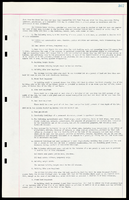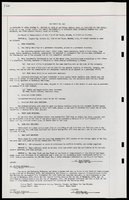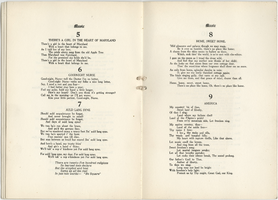Search the Special Collections and Archives Portal
Search Results
Lee, Rozita Villanueva, 1934-
Born in 1934 in Lahaina, Maui, Hawai'i as the seventh of seven daughters of a sugar plantation crew boss, Rozita Villanueva Lee recalls a privileged life, because when her father became a boss, the family got electricity, a telephone, indoor plumbing, and fluorescent lighting in their house. The camps were organized by nationality: the Filipino workers and their families lived in one camp, and the Japanese, Chinese, Portuguese, and "haole" workers and their families each lived in their own.
Person

Interview with Megan Gillespie Rice, June 22, 2005
Date
Archival Collection
Description
Text

Transcript of interview with Roger Bryan by Paul Murphy, February 27, 1979
Date
Archival Collection
Description
Text
Roger Bryan oral history interview
Identifier
Abstract
Oral history interview with Roger Bryan conducted by Paul Murphy on February 27, 1979 for the Ralph Roske Oral History Project on Early Las Vegas. Bryan, who was the principal of Harvey Dondero Elementary School at the time of the interview, mainly discusses his background in education and his experiences teaching at various schools around Southern Nevada. Bryan mentions several of the cities he lived in prior to coming to Las Vegas, Nevada as well as the various parts of town he lived in after arriving. He also talks specifically about the schools he attended in Las Vegas, superintendents in charge of the district, his decisions while on the school board, the extent of vandalism in schools, and how the school district has changed over the years. Bryan finalizes the interview with a discussion of the most influential teachers he had when he was a student.
Archival Collection

Mara Braun interview, September 9, 2019: transcript
Date
Archival Collection
Description
Interviewed by Barbara Tabach. Mara Braun, a native of Puerto Rico, has lived in Las Vegas since 1975. She is the owner/operator of a successful event and catering business. Mara married Abe Braun and raised their children in both Latinx and Jewish traditions.
Text

Correspondence from and to Lloyd Katz regarding establishment of a Chair in Judaic Studies at UNLV, 1973
Date
Archival Collection
Description
Lloyd Katz's letter to the Board of Regents requests information about the appropriate department in which to establish a Chair of Judaic Studies.
Text

Marc Franco Casibang oral history interview: transcript
Date
Archival Collection
Description
Oral history interview with Marc Franco Casibang conducted by Catherine Mariano on December 5, 2021 for Reflections: The Las Vegas Asian American and Pacific Islander Oral History Project. University of Nevada, Las Vegas nursing student Marc Franco Casibang shares stories of his childhood moving with his family from Cagayan province, Philippines to different locations around the world. After their international travels, the family immigrated to the United States and lived in South Dakota and Maryland before settling in Las Vegas, Nevada in 2014 when Marc was a high school sophomore. Marc Casibang discusses his experiences as an immigrant in America, learning English and adapting to the culture of the United States, and maintaining his Filipino identity. He shares his thoughts on Filipino stereotypes, the community he and his family have found in Las Vegas, his faith, and his educational pursuits to become a nurse.
Text



